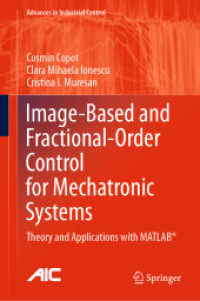基本説明
Contents: Fuzzy Selection of Software Components and of Web Services.- A Training Approach to Develop Reusable Software Components by Combining Adaptation Algorithms.- and more.
Full Description
This book illustrates the impact of soft computing techniques on software engineering research and practices dealing with a range of novel methods reshaping the software development process. Specifically, it is shown how Software Engineering tasks such as reuse-oriented classification (e. g. components' repositories), software diagnostic (e. g. bug detection and correction), effort prediction (e. g. project costs and time estimation), planning (e. g. project scheduling) and others can be appropriately handled by means of soft computing techniques. The book is a valuable reference for practitioners as well as an updated resource of ongoing interdisciplinary research in Soft Computing in Software Engineering.








